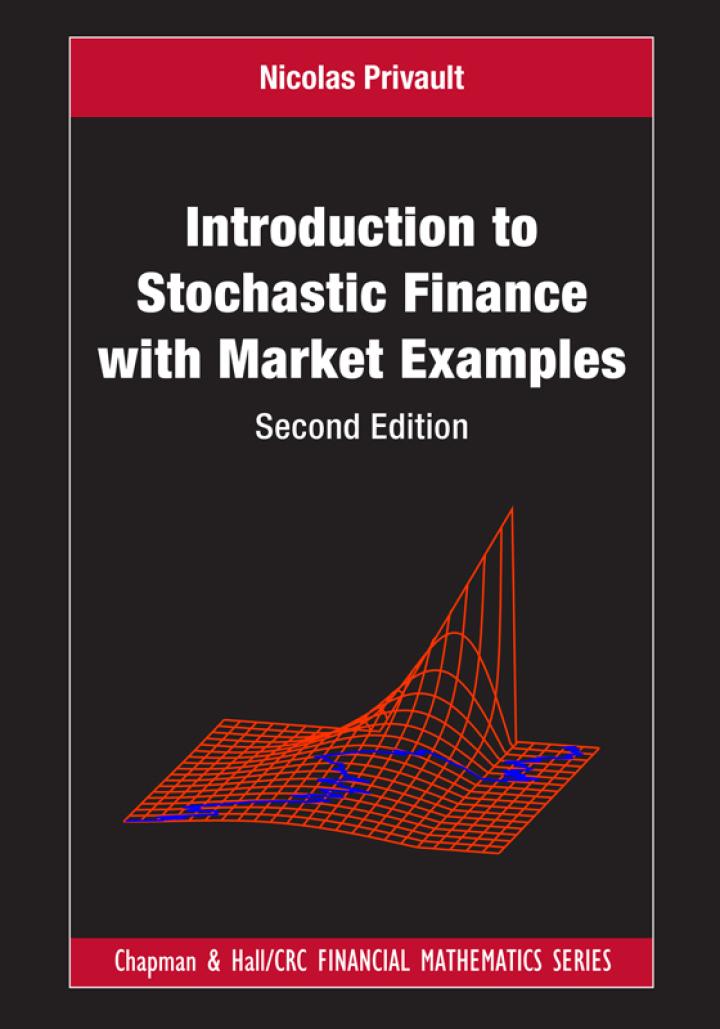Consider an asset priced (S_{t}) at time (t), with [d S_{t}=r S_{t} d t+sigma^{S} S_{t} d W_{t}^{S}]
Question:
Consider an asset priced \(S_{t}\) at time \(t\), with
\[d S_{t}=r S_{t} d t+\sigma^{S} S_{t} d W_{t}^{S}\]
and an exchange rate \(\left(R_{t}\right)_{t \in \mathbb{R}_{+}}\)given by
\[d R_{t}=\left(r-r^{\mathrm{f}}\right) R_{t} d t+\sigma^{R} R_{t} d W_{t}^{R}\]
from (16.20) in Proposition 16.10, where \(\left(W_{t}^{R}\right)_{t \in \mathbb{R}_{+}}\)is written as
\[W_{t}^{R}=ho W_{t}^{S}+\sqrt{1-ho^{2}} W_{t}, \quad t \geqslant 0\]
where \(\left(W_{t}\right)_{t \in \mathbb{R}_{+}}\)is a standard Brownian motion under \(\mathbb{P}^{*}\), independent of \(\left(W_{t}^{S}\right)_{t \in \mathbb{R}_{+}}\), i.e. we have
\[d W_{t}^{R} \cdot d W_{t}^{S}=ho d t\]
where \(ho\) is a correlation coefficient.
a) Let \[a=r^{l}-r^{\mathrm{f}}+ho \sigma^{R} \sigma^{S}-\left(\sigma^{R}\right)^{2}\]
and \(X_{t}=\mathrm{e}^{a t} S_{t} / R_{t}, t \geqslant 0\), and show by Exercise 16.10 that \(d X_{t}\) can be written as
\[d X_{t}=r X_{t} d t+\widehat{\sigma} X_{t} d W_{t}^{X}\]
where \(\left(W_{t}^{X}\right)_{t \in \mathbb{R}_{+}}\)is a standard Brownian motion under \(\mathbb{P}^{*}\) and \(\widehat{\sigma}\) is to be determined.
b) Compute the price
\[\mathrm{e}^{-(T-t) r} \mathbb{E}^{*}\left[\left.\left(\frac{S_{T}}{R_{T}}-\kappa\right)^{+} \rightvert\, \mathcal{F}_{t}\right]\]
of the quanto option at time \(t \in[0, T]\).
Data from Exercise 16.10
Assume that \(\left(S_{t}\right)_{t \in \mathbb{R}_{+}}\)and \(\left(N_{t}\right)_{t \in \mathbb{R}_{+}}\)satisfy the stochastic differential equations
\[d S_{t}=r_{t} S_{t} d t+\sigma_{t}^{S} S_{t} d W_{t}^{S}, \quad \text { and } \quad d N_{t}=\eta_{t} N_{t} d t+\sigma_{t}^{N} N_{t} d W_{t}^{N}\]
where \(\left(W_{t}^{S}\right)_{t \in \mathbb{R}_{+}}\)and \(\left(W_{t}^{N}\right)_{t \in \mathbb{R}_{+}}\)have the correlation
\[d W_{t}^{S} \cdot d W_{t}^{N}=ho d t\]
where \(ho \in[-1,1]\).
a) Show that \(\left(W_{t}^{N}\right)_{t \in \mathbb{R}_{+}}\)can be written as
\[W_{t}^{N}=ho W_{t}^{S}+\sqrt{1-ho^{2}} W_{t}, \quad t \geqslant 0\]
where \(\left(W_{t}\right)_{t \in \mathbb{R}_{+}}\)is a standard Brownian motion under \(\mathbb{P}^{*}\), independent of \(\left(W_{t}^{S}\right)_{t \in \mathbb{R}_{+}}\).
b) Letting \(X_{t}=S_{t} / N_{t}\), show that \(d X_{t}\) can be written as
\[d X_{t}=\left(r_{t}-\eta_{t}+\left(\sigma_{t}^{N}\right)^{2}-ho \sigma_{t}^{N} \sigma_{t}^{S}\right) X_{t} d t+\widehat{\sigma}_{t} X_{t} d W_{t}^{X}\]
where \(\left(W_{t}^{X}\right)_{t \in \mathbb{R}_{+}}\)is a standard Brownian motion under \(\mathbb{P}^{*}\) and \(\widehat{\sigma}_{t}\) is to be computed.
Step by Step Answer:

Introduction To Stochastic Finance With Market Examples
ISBN: 9781032288277
2nd Edition
Authors: Nicolas Privault





